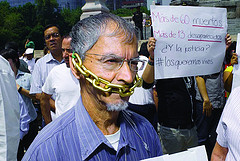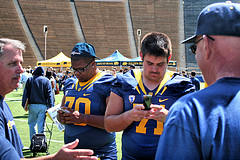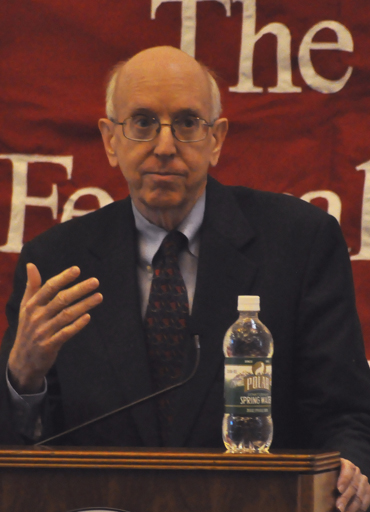Copyright 2007-25 Digital Media Law Project and respective authors. Except where otherwise noted,
content on this site is licensed under a Creative Commons Attribution-Noncommercial-ShareAlike 3.0 License: Details.
Use of this site is pursuant to our Terms of Use and Privacy Notice.
content on this site is licensed under a Creative Commons Attribution-Noncommercial-ShareAlike 3.0 License: Details.
Use of this site is pursuant to our Terms of Use and Privacy Notice.


 Censorship in China is nothing new. Heck, it's practically to be expected these days.
Censorship in China is nothing new. Heck, it's practically to be expected these days. On April 24, 2012, a Texas jury
On April 24, 2012, a Texas jury  What happens when the First Amendment collides with military decorum and respect for chain of command?
What happens when the First Amendment collides with military decorum and respect for chain of command?
 Venkat Balasubramani and Eric Goldman, over
Venkat Balasubramani and Eric Goldman, over  “RTs do not = endorsements.”
“RTs do not = endorsements.”
 Thanks to its ongoing war against the drug cartels, Mexico is one of the most dangerous places in the world for a journalist to work.
Thanks to its ongoing war against the drug cartels, Mexico is one of the most dangerous places in the world for a journalist to work.
 At a recent presentation during which I reviewed a number of cases and
court rule changes regarding juror use of social media and the Internet
during trial, an audience member asked me why American courts appeared
to be so lax in the face of such juror misbehavior, such as the Texas
case in which a juror who sent a "friend" request to the defendant in a
personal injury case
At a recent presentation during which I reviewed a number of cases and
court rule changes regarding juror use of social media and the Internet
during trial, an audience member asked me why American courts appeared
to be so lax in the face of such juror misbehavior, such as the Texas
case in which a juror who sent a "friend" request to the defendant in a
personal injury case  On Feb.
On Feb. While doing some research on recent media law suits here at the CMLP, I came across a particularly interesting case involving a dispute over the ownership of a Twitter account:
While doing some research on recent media law suits here at the CMLP, I came across a particularly interesting case involving a dispute over the ownership of a Twitter account:  The Federal Judicial Center
has released a
The Federal Judicial Center
has released a 
 By now, it is a given that many journalists have a regular presence on social networking services. The value of social media for gathering information, developing the journalist’s public persona, and promoting the journalist’s work is well-recognized.
By now, it is a given that many journalists have a regular presence on social networking services. The value of social media for gathering information, developing the journalist’s public persona, and promoting the journalist’s work is well-recognized. The Arkansas Supreme Court has reversed
a murder conviction – and death sentence – in a case where one juror
tweeted during trial, while another fell asleep. Both these problems,
the court said, constituted juror misconduct requiring reversal and a
new trial.
The Arkansas Supreme Court has reversed
a murder conviction – and death sentence – in a case where one juror
tweeted during trial, while another fell asleep. Both these problems,
the court said, constituted juror misconduct requiring reversal and a
new trial.  When web developer
When web developer  In what is now their
In what is now their 
Description:
On March 6, 2012, R.S., a minor, and R.S.'s mother S.S., filed suit in federal court in Minnesota against Minnewaska Area Middle School, the school district, the county, and a number of school and county employees (including the county Sheriff). All of the individuals were sued in both their individual and official capacities, except for the Chair of the County Board (who was sued only in his official capacity). The complaint alleges a series of incidents involving R.S.'s out-of-school Facebook use.
The first set of events alleged in the complaint involve Facebook posts R.S. wrote about one of the school's adult hall monitors. R.S. allegedly complained on Facebook about the hall monitor, and the post was brought to the attention of the school. The post was, according to the complaint, "purely off-campus speech," having been written off hours, involving no use of school equipment. R.S. was given detention, and required to write an apology to the hall monitor. R.S. then posted again on Facebook, wanting to know "who the f%$# told on [her]." This second post earned R.S. one day of in-school suspension.
A subsequent Facebook-related incident began when another student's mother called the school, concerned that "her son was communicating via his computer with R.S. about sex." Eventually, R.S. was called into a room with two school employees and a Deputy Sheriff, who "demanded" R.S.'s email and Facebook login information. R.S. "eventually" gave the information "involuntarily," and the school employees proceeded to search R.S.'s Facebook account on the Deputy's computer. Again, the complaint alleges that all of R.S.'s communications were made off-campus, without using school equipment.
R.S.'s lawsuit alleges a number of federal and state law claims:
The complaint also seeks a declaratory judgment that R.S.'s constitutional rights were violated. For relief, the complaint seeks a mixture of injunctions, damages, changes to school policy and training, an apology, and costs/fees.